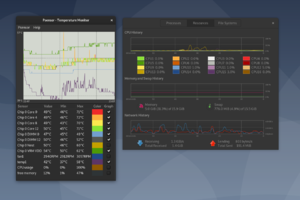Getting System Information
Revision as of 17:14, 24 January 2020 by FlyingBlackbird (talk | contribs) (Add NVMe handling (SSDs))
This page contains a list of commands to query your system properties (mainly hardware and firmware). It requires a working Linux installation (eg. Ubuntu Server or Fedora).
Contents
Installed CPU(s)
cat /proc/cpuinfo
Example result (excerpt):
cpu: POWER9, altivec supported
revision: 2.3 (pvr 004e 1203)
Motherboard
cat /proc/cpuinfo
Example result (excerpt):
machine: PowerNV C1P9S01 REV 1.01
firmware: OPAL
MMU: Radix
PCI devices
lspci
Example result (excerpt):
0005:02:00.0 VGA compatible controller: ASPEED Technology, Inc. ASPEED Graphics Family (rev 41)
SATA
Show recognized and activated SATA settings:
dmesg | grep -i sata
eg.
[ 3.542383] ata1: SATA max UDMA/133 abar m2048@0x60c100000000 port 0x600c100000100 irq 28
System Firmware versions
sudo lsmcode
eg.
Version of System Firmware :
Product Name : OpenPOWER Firmware
Procuct Version : blackbird-v2.3-rc2-65-g1bd4a042-dirty
Product Extra : skiboot-c81f9d6
Product Extra : hostboot-3beba24
Product Extra : linux-v4.19-openpower1-p048916f
Product Extra : petittboot-v1.10.3-pdd2d545
Product Extra : machine-xml-17e9e84
Product Extra : occ-b010273
Product Extra : sbe-459a974
Product Extra : hcode-81ae5fd
Sensors (CPU and drive temperatures etc.)
Installation:
sudo apt install lm-sensors
sudo sensors-detect # use all default values by pressing enter when asked
Display current sensor values:
sensors
You can also install GUI-based tools then, eg.:
- psensor
NVMe drives (mainly SSDs)
For NVMe drivers lm-sensors does not work.
Instead install the package nvme-cli:
sudo apt install nvme-cli
You can then get then the drive temperatur and other "SMART data" for the first NVMe drive via
sudo nvme smart-log /dev/nvme0
